美国总统奥巴马在哥本哈根联合国气候变化大会上的讲话
- 格式:doc
- 大小:85.00 KB
- 文档页数:8
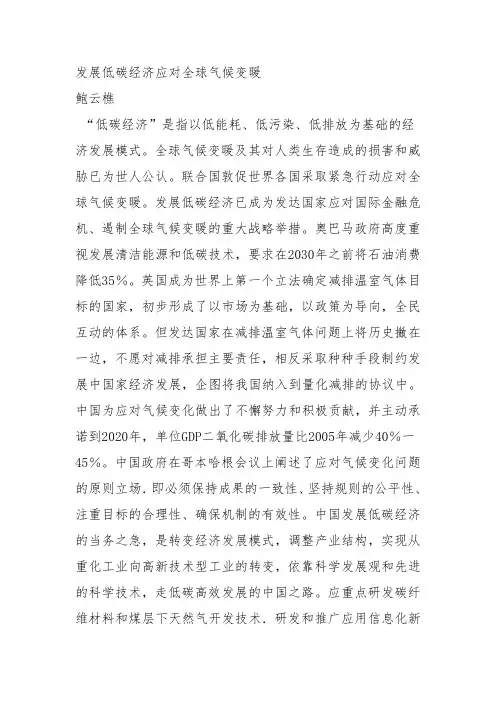
发展低碳经济应对全球气候变暖鲍云樵“低碳经济”是指以低能耗、低污染、低排放为基础的经济发展模式。
全球气候变暖及其对人类生存造成的损害和威胁已为世人公认。
联合国敦促世界各国采取紧急行动应对全球气候变暖。
发展低碳经济已成为发达国家应对国际金融危机、遏制全球气候变暖的重大战略举措。
奥巴马政府高度重视发展清洁能源和低碳技术,要求在2030年之前将石油消费降低35%。
英国成为世界上第一个立法确定减排温室气体目标的国家,初步形成了以市场为基础,以政策为导向,全民互动的体系。
但发达国家在减排温室气体问题上将历史撇在一边,不愿对减排承担主要责任,相反采取种种手段制约发展中国家经济发展,企图将我国纳入到量化减排的协议中。
中国为应对气候变化做出了不懈努力和积极贡献,并主动承诺到2020年,单位GDP二氧化碳排放量比2005年减少40%一45%。
中国政府在哥本哈根会议上阐述了应对气候变化问题的原则立场.即必须保持成果的一致性、坚持规则的公平性、注重目标的合理性、确保机制的有效性。
中国发展低碳经济的当务之急,是转变经济发展模式,调整产业结构,实现从重化工业向高新技术型工业的转变,依靠科学发展观和先进的科学技术,走低碳高效发展的中国之路。
应重点研发碳纤维材料和煤层下天然气开发技术.研发和推广应用信息化新型能源系统,推广先进能源技术的应用。
同时加快发展低碳能源,确立核能在我国能源构成中的战略地位.加速开发剩余水电资源,有序、健康地发展可再生能源。
与此同时,应强化节能教育,完善和细化《节能法》,推广节能新技术,提高回采率,保护煤炭资源;尽快推广超超临界发电机组;通过政策法规和先进技术,使建筑行业走上资源节约型和环境友好型的发展之路;重视研发新型动力汽车和新能源汽车。
低碳经济减排温室气体产业结构低碳能源核能可再生能源新型动力汽车1 前言进入新世纪以来.全球气候变暖及其对人类生存造成的损害和威胁已为世人公认。
在国际金融危机的背景下,一些原本对气候变暖不予重视的国家也开始积极起来。
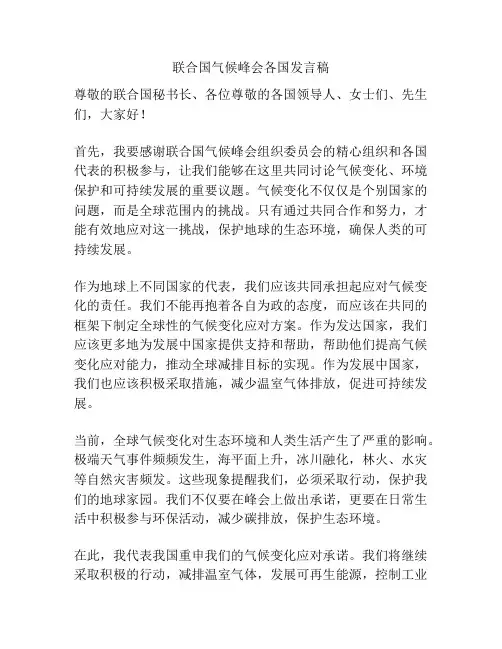
联合国气候峰会各国发言稿尊敬的联合国秘书长、各位尊敬的各国领导人、女士们、先生们,大家好!首先,我要感谢联合国气候峰会组织委员会的精心组织和各国代表的积极参与,让我们能够在这里共同讨论气候变化、环境保护和可持续发展的重要议题。
气候变化不仅仅是个别国家的问题,而是全球范围内的挑战。
只有通过共同合作和努力,才能有效地应对这一挑战,保护地球的生态环境,确保人类的可持续发展。
作为地球上不同国家的代表,我们应该共同承担起应对气候变化的责任。
我们不能再抱着各自为政的态度,而应该在共同的框架下制定全球性的气候变化应对方案。
作为发达国家,我们应该更多地为发展中国家提供支持和帮助,帮助他们提高气候变化应对能力,推动全球减排目标的实现。
作为发展中国家,我们也应该积极采取措施,减少温室气体排放,促进可持续发展。
当前,全球气候变化对生态环境和人类生活产生了严重的影响。
极端天气事件频频发生,海平面上升,冰川融化,林火、水灾等自然灾害频发。
这些现象提醒我们,必须采取行动,保护我们的地球家园。
我们不仅要在峰会上做出承诺,更要在日常生活中积极参与环保活动,减少碳排放,保护生态环境。
在此,我代表我国重申我们的气候变化应对承诺。
我们将继续采取积极的行动,减排温室气体,发展可再生能源,控制工业排放,推动低碳经济发展。
我们也将加大对发展中国家的支持,帮助他们提高气候变化应对能力,推动全球气候变化治理进程。
同时,我们也呼吁其他国家加大气候变化应对的力度,让我们共同努力,为全球环境保护和可持续发展作出贡献。
在这里,我也想重申我们的责任。
气候变化是全球性的问题,没有哪个国家可以独善其身。
我们必须共同行动,共同应对,通过合作推动全球气候治理进程。
我们将不遗余力地履行我们的国际义务,加大对发展中国家的支持,推动全球气候变化治理进程,为人类的未来和地球的未来做出贡献。
最后,我希望在此峰会上能够取得实质性的成果,达成共识,共同制定出更为具体的应对气候变化的方案和目标。
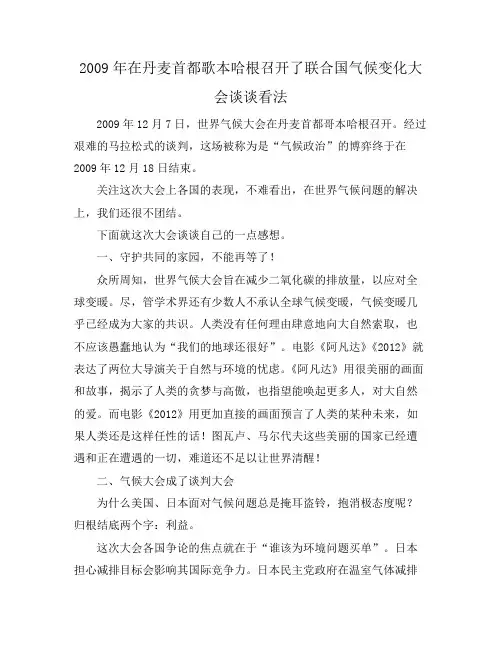
2009年在丹麦首都歌本哈根召开了联合国气候变化大会谈谈看法2009年12月7日,世界气候大会在丹麦首都哥本哈根召开。
经过艰难的马拉松式的谈判,这场被称为是“气候政治”的博弈终于在2009年12月18日结束。
关注这次大会上各国的表现,不难看出,在世界气候问题的解决上,我们还很不团结。
下面就这次大会谈谈自己的一点感想。
一、守护共同的家园,不能再等了!众所周知,世界气候大会旨在减少二氧化碳的排放量,以应对全球变暖。
尽,管学术界还有少数人不承认全球气候变暖,气候变暖几乎已经成为大家的共识。
人类没有任何理由肆意地向大自然索取,也不应该愚蠢地认为“我们的地球还很好”。
电影《阿凡达》《2012》就表达了两位大导演关于自然与环境的忧虑。
《阿凡达》用很美丽的画面和故事,揭示了人类的贪梦与高傲,也指望能唤起更多人,对大自然的爱。
而电影《2012》用更加直接的画面预言了人类的某种未来,如果人类还是这样任性的话!图瓦卢、马尔代夫这些美丽的国家已经遭遇和正在遭遇的一切,难道还不足以让世界清醒!二、气候大会成了谈判大会为什么美国、日本面对气候问题总是掩耳盗铃,抱消极态度呢?归根结底两个字:利益。
这次大会各国争论的焦点就在于“谁该为环境问题买单”。
日本担心减排目标会影响其国际竞争力。
日本民主党政府在温室气体减排问题上态度较为积极,鸠山由纪夫出任首相后不久便提出了“减排25%”的目标。
但此举在日本国内引发争论,经济界对“减排25%”抵触情绪严重,这一目标能否细化落实仍有待观察。
而美国作为人均温室气体排放量最大的国家不仅推卸责任,还要对转让先进能源技术设置障碍。
不仅如此,还想利用环保这张牌,利用其在技术上的优势,对不符合发达国家节能和减排方面标准的国家的出境商品,征收所谓的“边境碳关税”。
很明显这是以另外一种方式搞贸易保护主义,对于目前在技术、资金上都有限的发展中国家是很不公平的。
美国真的是很不厚道。
而像俄罗斯、德国等国家就很识时务,早就知道环保节能是大势所趋,在大会上表现到相当积极。
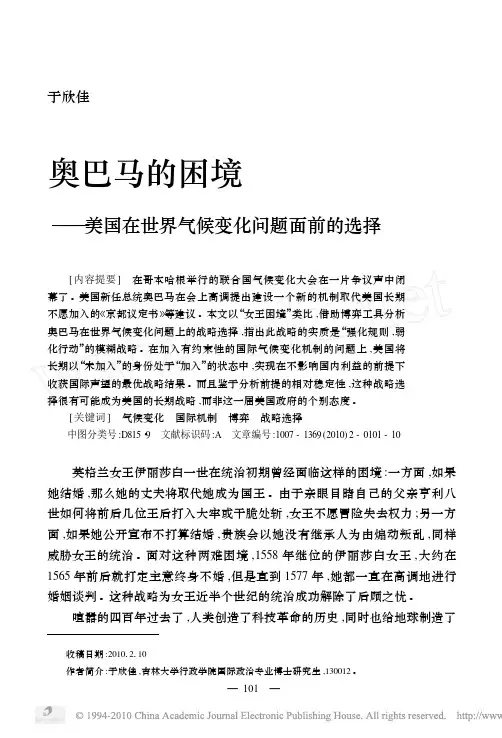
于欣佳奥巴马的困境———美国在世界气候变化问题面前的选择 [内容提要] 在哥本哈根举行的联合国气候变化大会在一片争议声中闭幕了。
美国新任总统奥巴马在会上高调提出建设一个新的机制取代美国长期不愿加入的《京都议定书》等建议。
本文以“女王困境”类比,借助博弈工具分析奥巴马在世界气候变化问题上的战略选择,指出此战略的实质是“强化规则,弱化行动”的模糊战略。
在加入有约束性的国际气候变化机制的问题上,美国将长期以“未加入”的身份处于“加入”的状态中,实现在不影响国内利益的前提下收获国际声望的最优战略结果。
而且鉴于分析前提的相对稳定性,这种战略选择很有可能成为美国的长期战略,而非这一届美国政府的个别态度。
[关键词] 气候变化 国际机制 博弈 战略选择中图分类号:D815・9 文献标识码:A 文章编号:1007-1369(2010)2-0101-10 英格兰女王伊丽莎白一世在统治初期曾经面临这样的困境:一方面,如果她结婚,那么她的丈夫将取代她成为国王。
由于亲眼目睹自己的父亲亨利八世如何将前后几位王后打入大牢或干脆处斩,女王不愿冒险失去权力;另一方面,如果她公开宣布不打算结婚,贵族会以她没有继承人为由煽动叛乱,同样威胁女王的统治。
面对这种两难困境,1558年继位的伊丽莎白女王,大约在1565年前后就打定主意终身不婚,但是直到1577年,她都一直在高调地进行婚姻谈判。
这种战略为女王近半个世纪的统治成功解除了后顾之忧。
喧嚣的四百年过去了,人类创造了科技革命的历史,同时也给地球制造了 收稿日期:201012110 作者简介:于欣佳,吉林大学行政学院国际政治专业博士研究生,130012。
世界经济与政治论坛・2010年第2期几乎难以承受的负担。
面对人类活动造成的全球气候变化问题,国际社会开展了一系列协调合作试图力挽狂澜。
在这些协调过程中,作为世界最大经济实体的美国被推上了风口浪尖,聚焦了全世界目光的时任美国总统奥巴马似乎遇到了当年伊丽莎白女王的困境。
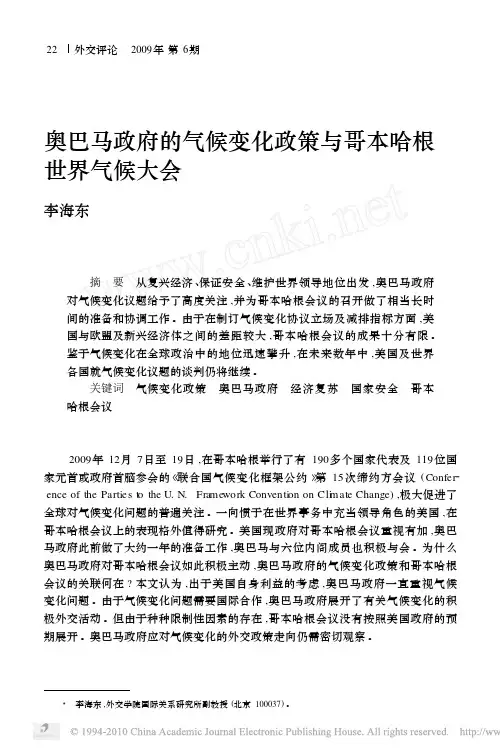
3李海东,外交学院国际关系研究所副教授(北京100037)。
奥巴马政府的气候变化政策与哥本哈根世界气候大会李海东摘 要 从复兴经济、保证安全、维护世界领导地位出发,奥巴马政府对气候变化议题给予了高度关注,并为哥本哈根会议的召开做了相当长时间的准备和协调工作。
由于在制订气候变化协议立场及减排指标方面,美国与欧盟及新兴经济体之间的差距较大,哥本哈根会议的成果十分有限。
鉴于气候变化在全球政治中的地位迅速攀升,在未来数年中,美国及世界各国就气候变化议题的谈判仍将继续。
关键词 气候变化政策奥巴马政府经济复苏国家安全哥本哈根会议2009年12月7日至19日,在哥本哈根举行了有190多个国家代表及119位国家元首或政府首脑参会的《联合国气候变化框架公约》第15次缔约方会议(Confer 2ence of the Parties t o the U.N.Fra me work Conventi on on Cli m ate Change ),极大促进了全球对气候变化问题的普遍关注。
一向惯于在世界事务中充当领导角色的美国,在哥本哈根会议上的表现格外值得研究。
美国现政府对哥本哈根会议重视有加,奥巴马政府此前做了大约一年的准备工作,奥巴马与六位内阁成员也积极与会。
为什么奥巴马政府对哥本哈根会议如此积极主动,奥巴马政府的气候变化政策和哥本哈根会议的关联何在?本文认为,出于美国自身利益的考虑,奥巴马政府一直重视气候变化问题。
由于气候变化问题需要国际合作,奥巴马政府展开了有关气候变化的积极外交活动。
但由于种种限制性因素的存在,哥本哈根会议没有按照美国政府的预期展开。
奥巴马政府应对气候变化的外交政策走向仍需密切观察。
一、奥巴马政府关注气候变化议题的主要原因奥巴马上台以来,改变了布什政府在气候变化问题上长期消极被动、无所作为的做法,为发展清洁能源和应对气候变化,其所做的具体工作已超过美国以往历任总统。
这尤其体现在美国国会在奥巴马政府的推动下,正通过立法的方式控制温室气体排放。

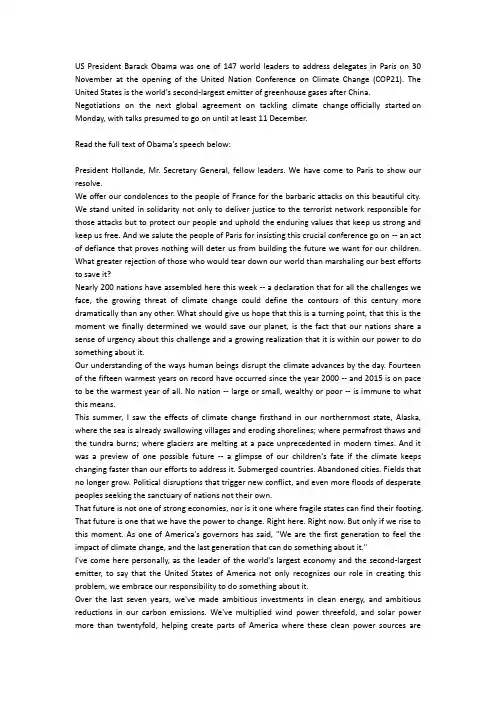
US President Barack Obama was one of 147 world leaders to address delegates in Paris on 30 November at the opening of the United Nation Conference on Climate Change (COP21). The United States is the world's second-largest emitter of greenhouse gases after China. Negotiations on the next global agreement on tackling climate change officially started on Monday, with talks presumed to go on until at least 11 December.Read the full text of Obama's speech below:President Hollande, Mr. Secretary General, fellow leaders. We have come to Paris to show our resolve.We offer our condolences to the people of France for the barbaric attacks on this beautiful city. We stand united in solidarity not only to deliver justice to the terrorist network responsible for those attacks but to protect our people and uphold the enduring values that keep us strong and keep us free. And we salute the people of Paris for insisting this crucial conference go on -- an act of defiance that proves nothing will deter us from building the future we want for our children. What greater rejection of those who would tear down our world than marshaling our best efforts to save it?Nearly 200 nations have assembled here this week -- a declaration that for all the challenges we face, the growing threat of climate change could define the contours of this century more dramatically than any other. What should give us hope that this is a turning point, that this is the moment we finally determined we would save our planet, is the fact that our nations share a sense of urgency about this challenge and a growing realization that it is within our power to do something about it.Our understanding of the ways human beings disrupt the climate advances by the day. Fourteen of the fifteen warmest years on record have occurred since the year 2000 -- and 2015 is on pace to be the warmest year of all. No nation -- large or small, wealthy or poor -- is immune to what this means.This summer, I saw the effects of climate change firsthand in our northernmost state, Alaska, where the sea is already swallowing villages and eroding shorelines; where permafrost thaws and the tundra burns; where glaciers are melting at a pace unprecedented in modern times. And it was a preview of one possible future -- a glimpse of our children's fate if the climate keeps changing faster than our efforts to address it. Submerged countries. Abandoned cities. Fields that no longer grow. Political disruptions that trigger new conflict, and even more floods of desperate peoples seeking the sanctuary of nations not their own.That future is not one of strong economies, nor is it one where fragile states can find their footing. That future is one that we have the power to change. Right here. Right now. But only if we rise to this moment. As one of America's governors has said, "We are the first generation to feel the impact of climate change, and the last generation that can do something about it."I've come here personally, as the leader of the world's largest economy and the second-largest emitter, to say that the United States of America not only recognizes our role in creating this problem, we embrace our responsibility to do something about it.Over the last seven years, we've made ambitious investments in clean energy, and ambitious reductions in our carbon emissions. We've multiplied wind power threefold, and solar power more than twentyfold, helping create parts of America where these clean power sources arefinally cheaper than dirtier, conventional power. We've invested in energy efficiency in every way imaginable. We've said no to infrastructure that would pull high-carbon fossil fuels from the ground, and we've said yes to the first-ever set of national standards limiting the amount of carbon pollution our power plants can release into the sky.The advances we've made have helped drive our economic output to all-time highs, and drive our carbon pollution to its lowest levels in nearly two decades.But the good news is this is not an American trend alone. Last year, the global economy grew while global carbon emissions from burning fossil fuels stayed flat. And what this means can't be overstated. We have broken the old arguments for inaction. We have proved that strong economic growth and a safer environment no longer have to conflict with one another; they can work in concert with one another.And that should give us hope. One of the enemies that we'll be fighting at this conference is cynicism, the notion we can't do anything about climate change. Our progress should give us hope during these two weeks -- hope that is rooted in collective action.Earlier this month in Dubai, after years of delay, the world agreed to work together to cut the super-pollutants known as HFCs. That's progress. Already, prior to Paris, more than 180 countries representing nearly 95 percent of global emissions have put forward their own climate targets. That is progress. For our part, America is on track to reach the emissions targets that I set six years ago in Copenhagen -- we will reduce our carbon emissions in the range of 17 percent below 2005 levels by 2020. And that's why, last year, I set a new target: America will reduce our emissions 26 to 28 percent below 2005 levels within 10 years from now.So our task here in Paris is to turn these achievements into an enduring framework for human progress -- not a stopgap solution, but a long-term strategy that gives the world confidence in a low-carbon future.Here, in Paris, let's secure an agreement that builds in ambition, where progress paves the way for regularly updated targets -- targets that are not set for each of us but by each of us, taking into account the differences that each nation is facing.Here in Paris, let's agree to a strong system of transparency that gives each of us the confidence that all of us are meeting our commitments. And let's make sure that the countries who don't yet have the full capacity to report on their targets receive the support that they need.Here in Paris, let's reaffirm our commitment that resources will be there for countries willing to do their part to skip the dirty phase of development. And I recognize this will not be easy. It will take a commitment to innovation and the capital to continue driving down the cost of clean energy. And that's why, this afternoon, I'll join many of you to announce an historic joint effort to accelerate public and private clean energy innovation on a global scale.Here in Paris, let's also make sure that these resources flow to the countries that need help preparing for the impacts of climate change that we can no longer avoid. We know the truth that many nations have contributed little to climate change but will be the first to feel its most destructive effects. For some, particularly island nations -- whose leaders I'll meet with tomorrow -- climate change is a threat to their very existence. And that's why today, in concert with other nations, America confirms our strong and ongoing commitment to the Least Developed Countries Fund. And tomorrow, we'll pledge new contributions to risk insurance initiatives that helpvulnerable populations rebuild stronger after climate-related disasters.And finally, here in Paris, let's show businesses and investors that the global economy is on a firm path towards a low-carbon future. If we put the right rules and incentives in place, we'll unleash the creative power of our best scientists and engineers and entrepreneurs to deploy clean energy technologies and the new jobs and new opportunities that they create all around the world. There are hundreds of billions of dollars ready to deploy to countries around the world if they get the signal that we mean business this time. Let's send that signal.That's what we seek in these next two weeks. Not simply an agreement to roll back the pollution we put into our skies, but an agreement that helps us lift people from poverty without condemning the next generation to a planet that's beyond its capacity to repair. Here, in Paris, we can show the world what is possible when we come together, united in common effort and by a common purpose.And let there be no doubt, the next generation is watching what we do. Just over a week ago, I was in Malaysia, where I held a town hall with young people, and the first question I received was from a young Indonesian woman. And it wasn't about terrorism, it wasn't about the economy, it wasn't about human rights. It was about climate change. And she asked whether I was optimistic about what we can achieve here in Paris, and what young people like her could do to help.I want our actions to show her that we're listening. I want our actions to be big enough to draw on the talents of all our people -- men and women, rich and poor -- I want to show her passionate, idealistic young generation that we care about their future.For I believe, in the words of Dr. Martin Luther King, Jr., that there is such a thing as being too late. And when it comes to climate change, that hour is almost upon us. But if we act here, if we act now, if we place our own short-term interests behind the air that our young people will breathe, and the food that they will eat, and the water that they will drink, and the hopes and dreams that sustain their lives, then we won't be too late for them.And, my fellow leaders, accepting this challenge will not reward us with moments of victory that are clear or quick. Our progress will be measured differently -- in the suffering that is averted, and a planet that's preserved. And that's what's always made this so hard. Our generation may not even live to see the full realization of what we do here. But the knowledge that the next generation will be better off for what we do here -- can we imagine a more worthy reward than that? Passing that on to our children and our grandchildren, so that when they look back and they see what we did here in Paris, they can take pride in our achievement.Let that be the common purpose here in Paris. A world that is worthy of our children. A world that is marked not by conflict, but by cooperation; and not by human suffering, but by human progress. A world that's safer, and more prosperous, and more secure, and more free than the one that we inherited.Let's get to work. Thank you very much.。
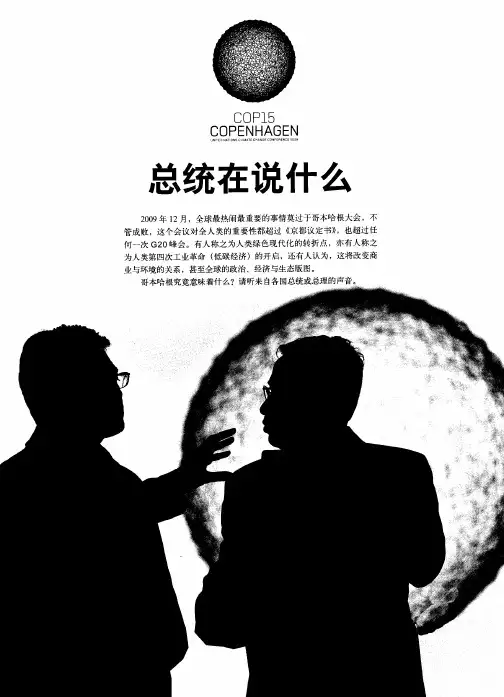
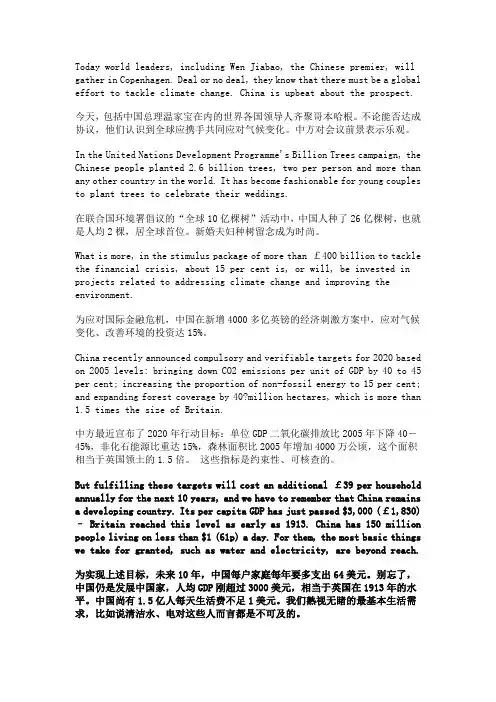
Today world leaders, including Wen Jiabao, the Chinese premier, will gather in Copenhagen. Deal or no deal, they know that there must be a global effort to tackle climate change. China is upbeat about the prospect.今天,包括中国总理温家宝在内的世界各国领导人齐聚哥本哈根。
不论能否达成协议,他们认识到全球应携手共同应对气候变化。
中方对会议前景表示乐观。
In the United Nations Development Programme's Billion Trees campaign, the Chinese people planted 2.6 billion trees, two per person and more than any other country in the world. It has become fashionable for young couples to plant trees to celebrate their weddings.在联合国环境署倡议的“全球10亿棵树”活动中,中国人种了26亿棵树,也就是人均2棵,居全球首位。
新婚夫妇种树留念成为时尚。
What is more, in the stimulus package of more than £400 billion to tackle the financial crisis, about 15 per cent is, or will, be invested in projects related to addressing climate change and improving the environment.为应对国际金融危机,中国在新增4000多亿英镑的经济刺激方案中,应对气候变化、改善环境的投资达15%。
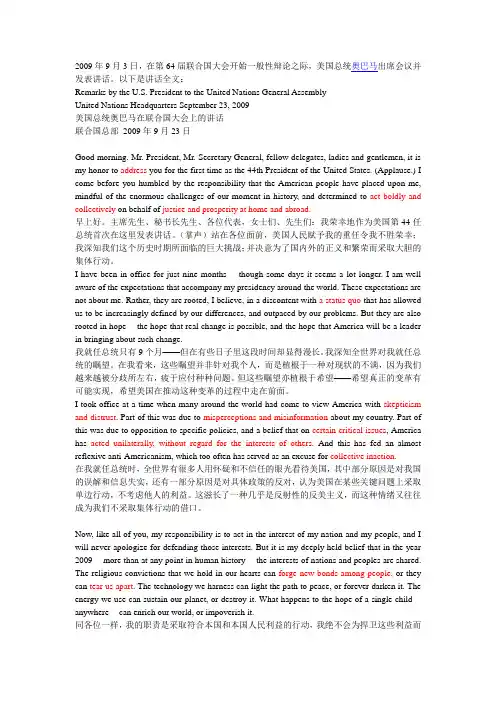
2009年9月3日,在第64届联合国大会开始一般性辩论之际,美国总统奥巴马出席会议并发表讲话。
以下是讲话全文:Remarks by the U.S. President to the United Nations General AssemblyUnited Nations Headquarters September 23, 2009美国总统奥巴马在联合国大会上的讲话联合国总部2009年9月23日Good morning. Mr. President, Mr. Secretary General, fellow delegates, ladies and gentlemen, it is my honor to address you for the first time as the 44th President of the United States. (Applause.) I come before you humbled by the responsibility that the American people have placed upon me, mindful of the enormous challenges of our moment in history, and determined to act boldly and collectively on behalf of justice and prosperity at home and abroad.早上好。
主席先生、秘书长先生、各位代表,女士们、先生们:我荣幸地作为美国第44任总统首次在这里发表讲话。
(掌声)站在各位面前,美国人民赋予我的重任令我不胜荣幸;我深知我们这个历史时期所面临的巨大挑战;并决意为了国内外的正义和繁荣而采取大胆的集体行动。
I have been in office for just nine months -- though some days it seems a lot longer. I am well aware of the expectations that accompany my presidency around the world. These expectations are not about me. Rather, they are rooted, I believe, in a discontent with a status quo that has allowed us to be increasingly defined by our differences, and outpaced by our problems. But they are also rooted in hope -- the hope that real change is possible, and the hope that America will be a leader in bringing about such change.我就任总统只有9个月——但在有些日子里这段时间却显得漫长。
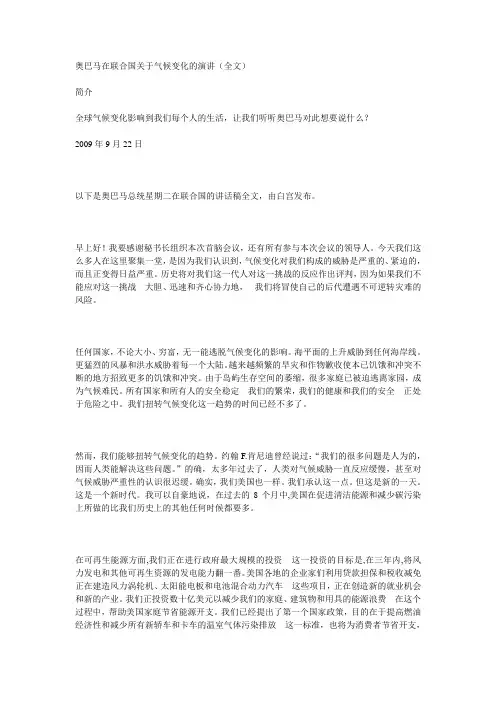
奥巴马在联合国关于气候变化的演讲(全文)简介全球气候变化影响到我们每个人的生活,让我们听听奥巴马对此想要说什么?2009年9月22日以下是奥巴马总统星期二在联合国的讲话稿全文,由白宫发布。
早上好!我要感谢秘书长组织本次首脑会议,还有所有参与本次会议的领导人。
今天我们这么多人在这里聚集一堂,是因为我们认识到,气候变化对我们构成的威胁是严重的、紧迫的,而且正变得日益严重。
历史将对我们这一代人对这一挑战的反应作出评判,因为如果我们不能应对这一挑战---大胆、迅速和齐心协力地,---我们将冒使自己的后代遭遇不可逆转灾难的风险。
任何国家,不论大小、穷富,无一能逃脱气候变化的影响。
海平面的上升威胁到任何海岸线。
更猛烈的风暴和洪水威胁着每一个大陆。
越来越频繁的旱灾和作物歉收使本已饥饿和冲突不断的地方招致更多的饥饿和冲突。
由于岛屿生存空间的萎缩,很多家庭已被迫逃离家园,成为气候难民。
所有国家和所有人的安全稳定---我们的繁荣,我们的健康和我们的安全---正处于危险之中。
我们扭转气候变化这一趋势的时间已经不多了。
然而,我们能够扭转气候变化的趋势。
约翰F.肯尼迪曾经说过:“我们的很多问题是人为的,因而人类能解决这些问题。
”的确,太多年过去了,人类对气候威胁一直反应缓慢,甚至对气候威胁严重性的认识很迟缓。
确实,我们美国也一样。
我们承认这一点。
但这是新的一天。
这是一个新时代。
我可以自豪地说,在过去的8个月中,美国在促进清洁能源和减少碳污染上所做的比我们历史上的其他任何时候都要多。
在可再生能源方面,我们正在进行政府最大规模的投资---这一投资的目标是,在三年内,将风力发电和其他可再生资源的发电能力翻一番。
美国各地的企业家们利用贷款担保和税收减免正在建造风力涡轮机、太阳能电板和电池混合动力汽车---这些项目,正在创造新的就业机会和新的产业。
我们正投资数十亿美元以减少我们的家庭、建筑物和用具的能源浪费---在这个过程中,帮助美国家庭节省能源开支。
1 ,低碳经济的概念:所谓低碳经济,是指在可持续发展理念指导下,通过技术创新、制度创新、产业转型、新能源开发等多种手段,尽可能地减少煤炭石油等高碳能源消耗,减少温室气体排放,达到经济社会发展与生态环境保护双赢的一种经济发展形态。
发展低碳经济,一方面是积极承担环境保护责任,完成国家节能降耗指标的要求;另一方面是调整经济结构,提高能源利用效益,发展新兴工业,建设生态文明。
这是摒弃以往先污染后治理、先低端后高端、先粗放后集约的发展模式的现实途径,是实现经济发展与资源环境保护双赢的必然选择。
2低碳经济对中国的意义对中国来说,低碳经济意义更为重要。
第一,直接就是应对气候变化。
第二,保障国家能源安全,我国对煤炭依赖很重,煤炭是高碳能源,我国70%的能源依靠煤炭,所以发展低碳经济对我国能源安全是非常重要的。
第三,发展低碳经济直接相关我国污染问题,我国很大一部分的二氧化硫、氮氧化物都来自于燃煤,所以发展低碳经济对控制温室气体,对控制污染物有很重要的意义。
3,低碳经济对中国的意义;低碳经济是以低能耗、低污染、低排放为基础的经济模式,是人类社会继农业文明、工业文明之后的又一次重大进步。
低碳经济实质是能源高效利用、清洁能源开发、追求绿色GDP的问题,核心是能源技术和减排技术创新、产业结构和制度创新以及人类生存发展观念的根本性转变。
一是我国人均能源资源拥有量不高,探明量仅相当于世界人均水平的51%。
这种先天不足再加上后天的粗放利用,客观上要求我们发展低碳经济。
二是碳排放总量突出。
按照联合国通用的公式计算,碳排放总量实际上是4个因素的乘积:人口数量、人均GDP、单位GDP的能耗量(能源强度)、单位能耗产生的碳排放(碳强度)。
我国人口众多,经济增长快速,能源消耗巨大,碳排放总量不可避免地逐年增大,其中还包含着出口产品的大量"内涵能源"。
我们靠高碳路径生产廉价产品出口,却背上了碳排放总量大的"黑锅"。
哥本哈根世界气候大会[摘要] 2009年12月7日-18日哥本哈根联合国气候大会在丹麦首都哥本哈根贝拉中心〔Bella Center〕举行,超过85个国家元首或政府首脑、192个国家的环境部长出席。
会议的主要目的在于商讨《京都议定书》一期承诺到期后的后续方案,就未来应对气候变化的全球行动签署新的协议。
会议在争吵声中最终只达成了一个无法律约束力的《哥本哈根协议》,但是《哥本哈根协议》维护了《联合国气候变化框架公约》及其《京都议定书》确立的“共同但有区别的责任”原则,就发达国家实行强制减排和发展中国家采取自主减缓行动作出了安排,并就全球长期目标、资金和技术支持、透明度等焦点问题达成广泛共识。
一、哥本哈根联合国气候变化大会哥本哈根气候大会全称是《联合国气候变化框架公约》第15次缔约方会议暨《京都议定书》第5次缔约方会议,由于该次会议是在丹麦首都哥本哈根举行,因此也被称为哥本哈根联合国气候变化大会。
1992年,联合国联合国环境与发展大会〔以下简称联合国环发大会〕在巴西的里约热内卢召开,大会通过了《联合国气候变化框架公约》〔United Nations Framework Convention on Climate Change,以下简称《框架公约》,英文缩写UNFCCC)。
公约于1994年3月21日正式生效,截至目前为止,公约已拥有192个缔约方。
《框架公约》是世界上第一个为全面控制二氧化碳等温室气体排放,以应对全球气候变暖给人类经济和社会带来不利影响的国际公约。
此外,公约还为国际社会在对付全球气候变化问题上进行国际合作提供了一个基本框架。
联合国气候变化大会就是公约缔约方基于这一基本框架,为妥善解决全球气候变化所带来的一系列问题而举行的。
自1995年3月28日首次缔约方大会在柏林举行以来,缔约方每年都召开会议。
迄今为止,不包括2009年哥本哈根大会在内,联合国气候变化大会已经召开了14次。
2009年12月7日-18日哥本哈根气候大会在丹麦首都哥本哈根贝拉中心〔Bella Center〕举行,超过85个国家元首或政府首脑、192个国家的环境部长出席。
Thank you very much. Good morning. I want to thank the Secretary General for organizing this summit, and all the leaders who are participating. That so many of us are here today is a recognition that the threat from climate change is serious, it is urgent, and it is growing. Our generation’s response to this challenge will be judged by history, for if we fail to meet it -- boldly, swiftly, and together -- we risk consigning future generations to an irreversible catastrophe.No nation, however large or small, wealthy or poor, can escape the impact of climate change. Rising sea levels threaten every coastline. More powerful storms and floods threaten every continent. More frequent droughts and crop failures breed hunger and conflict in places where hunger and conflict already thrive. On shrinking islands, families are already being forced to flee their homes as climate refugees. The security and stability of each nation and all peoples -- our prosperity, our health, and our safety -- are in jeopardy. And the time we have to reverse this tide is running out.And yet, we can reverse it. John F. Kennedy once observed that "Our problems are man-made, therefore they may be solved by man." It is true that for too many years, mankind has been slow to respond or even recognize the magnitude of the climate threat. It is true of my own country, as well. We recognize that. But this is a new day. It is a new era. And I am proud to say that the United States has done more to promote clean energy and reduce carbon pollution in the last eight months than at any other time in our history.We are making our government’s largest ever investment in renewable energy -- an investment aimed at doubling the generating capacity from wind and other renewable resources in three years. Across America, entrepreneurs are constructing wind turbines and solar panels and batteries for hybrid cars with the help of loan guarantees and tax credits -- projects that are creating new jobs and new industries. We’re investing billions to cut energy waste in our homes, our buildings, and appliances -- helping American families save money on energy bills in the process.We’ve proposed the very first national policy aimed at both increasing fuel economy and reducing greenhouse gas pollution for all new cars and trucks -- a standard that will also save consumers money and our nation oil. We’re moving forward with our nation’s first offshore wind energy projects. We’re investing billions to capture carbon pollution so that we can clean up our coal plants. And just this week, we announced that for the first time ever, we’ll begin tracking how much greenhouse gas pollution is being emitted throughout the country.Later this week, I will work with my colleagues at the G20 to phase out fossil fuel subsidies so that we can better address our climate challenge. And already, we know that the recent drop in overall U.S. emissions is due in part to steps that promote greater efficiency and greater use of renewable energy.Most importantly, the House of Representatives passed an energy and climate bill in June that would finally make clean energy the profitable kind of energy for American businesses and dramatically reduce greenhouse gas emissions. One committee has already acted on this bill in the Senate and I look forward to engaging with others as we move forward.Because no one nation can meet this challenge alone, the United States has also engaged more allies and partners in finding a solution than ever before. In April, we convened the first of what have now been six meetings of the Major Economies Forum on Energy and Climate here in the United States. In Trinidad, I proposed an Energy and Climate Partnership for the Americas.We’ve worked through the World Bank to promote renewable energy projects and technologies in the developing world. And we have put climate at the top of our diplomatic agenda when it comes to our relationships with countries as varied as China and Brazil; India and Mexico; from the continent of Africa to the continent of Europe.Taken together, these steps represent a historic recognition on behalf of the American people and their government. We understand the gravity of the climate threat. We are determined to act. And we will meet our responsibility to future generations.But though many of our nations have taken bold action and share in this determination, we did not come here to celebrate progress today. We came because there’s so much more progress to be made. We came because there’s so much more work to be done.It is work that will not be easy. As we head towards Copenhagen, there should be no illusions that the hardest part of our journey is in front of us. We seek sweeping but necessary change in the midst of a global recession, where every nation’s most immediate pr iority is reviving their economy and putting their people back to work. And so all of us will face doubts and difficulties in our own capitals as we try to reach a lasting solution to the climate challenge.But I’m here today to say that difficulty is no excuse for complacency. Unease is no excuse for inaction. And we must not allow the perfect to become the enemy of progress. Each of us must do what we can when we can to grow our economies without endangering our planet -- and we must all do it together. We must seize the opportunity to make Copenhagen a significant step forward in the global fight against climate change.We also cannot allow the old divisions that have characterized the climate debate for so many years to block our progress. Yes, the developed nations that caused much of the damage to our climate over the last century still have a responsibility to lead -- and that includes the United States. And we will continue to do so -- by investing in renewable energy and promoting greater efficiency and slashing our emissions to reach the targets we set for 2020 and our long-term goal for 2050.But those rapidly growing developing nations that will produce nearly all the growth in global carbon emissions in the decades ahead must do their part, as well. Some of these nations have already made great strides with the development and deployment of clean energy. Still, they need to commit to strong measures at home and agree to stand behind those commitments just as the developed nations must stand behind their own. We cannot meet this challenge unless all the largest emitters of greenhouse gas pollution act together. There’s no other way.We must also energize our efforts to put other developing nations -- especially the poorest and most vulnerable -- on a path to sustained growth. These nations do not have the same resources to combat climate change as countries like the United States or China do, but they have the most immediate stake in a solution. For these are the nations that are already living with the unfolding effects of a warming planet -- famine, drought, disappearing coastal villages, and the conflicts that arise from scarce resources. Their future is no longer a choice between a growing economy and a cleaner planet, because their survival depends on both. It will do little good to alleviate poverty if you can no longer harvest your crops or finddrinkable water.And that is why we have a responsibility to provide the financial and technical assistance needed to help these nations adapt to the impacts of climate change and pursue low-carbon development.What we are seeking, after all, is not simply an agreement to limit greenhouse gas emissions. We seek an agreement that will allow all nations to grow and raise living standards without endangering the planet. By developing and disseminating clean technology and sharing our know-how, we can help developing nations leap-frog dirty energy technologies and reduce dangerous emissions.Mr. Secretary, as we meet here today, the good news is that after too many years of inaction and denial, there’s finally widespread recognition of the urgency of the challenge before us. We know what needs to be done. We know that our planet’s future dep ends on a global commitment to permanently reduce greenhouse gas pollution. We know that if we put the right rules and incentives in place, we will unleash the creative power of our best scientists and engineers and entrepreneurs to build a better world. And so many nations have already taken the first step on the journey towards that goal.But the journey is long and the journey is hard. And we don’t have much time left to make that journey. It’s a journey that will require each of us to persevere throug h setbacks, and fight for every inch of progress, even when it comes in fits and starts. So let us begin. For if we are flexible and pragmatic, if we can resolve to work tirelessly in common effort, then we will achieve our common purpose: a world that is safer, cleaner, and healthier than the one we found; and a future that is worthy of our children.Thank you very much.多谢诸位。
美国总统奥巴马在联合国气候变化大会的讲话2009年12月18日,奥巴马总统在哥本哈根联合国气候变化大会发表讲话,阐述美国在气候变化问题上的立场和采取的行动。
以下是讲话的全文:Remarks at Copenhagen Summit on Climate Changeby the U.S.President Barack ObamaCopenhagen, DenmarkDecember 18, 2009美国总统在联合国气候变化大会的讲话丹麦,哥本哈根2009年12月18日Good morning. It is an honor for me to join this distinguished group of leaders from nations around the world. We come here in Copenhagen because climate change poses a grave and growing danger to our people. All of you would not be here unless you —like me —were convinced that this danger is real. This is not fiction, it is science. Unchecked, climate change will pose unacceptable risks to our security, our economies, and our planet. This much we know.早上好。
十分荣幸能与世界各国尊贵的领导人汇聚一堂。
我们来到哥本哈根,是因为气候变化对各国人民构成的严重威胁与日俱增。
诸位如果不相信这一危险确实存在,你们──同我一样──都不会来到这里。
这不是凭空虚构,这是科学。
如果不加以制止,气候变化就将对我们的安全、我们的经济和我们的地球构成不可接受的危险。
白宫新闻秘书办公室2012年9月25日总统在联合国大会(the United Nations General Assembly)发表讲话联合国总部纽约州,纽约市(New York City, NY)美国东部夏令时间上午10:22总统:主席先生、秘书长先生、代表们、女士们先生们:今天我首先为诸位讲述一位美国人的经历,他的名字是克里斯•史蒂文斯(Chris Stevens)。
克里斯出生在加利福尼亚州格拉斯山谷镇(Grass Valley, California),父母是律师和音乐家。
克里斯年轻时参加了和平队(Peace Corps),在摩洛哥教英语。
他对北非和中东人民的感情和敬意油然而生。
他立志终身坚持自己的这份承诺。
他作为一名外交官,足迹遍及埃及、叙利亚、沙特阿拉伯、利比亚等国。
人们都知道,他常常在他工作的城市深入大街小巷,尝尝当地的食品,尽可能多地与居民见面,用阿拉伯语交谈和倾听,脸上带着灿烂的笑容。
在利比亚革命初期,克里斯搭乘一艘货轮前往班加西(Benghazi)工作。
他作为美国的代表,帮助利比亚人民解决暴力冲突,为伤病员提供护理,同时酝酿了未来全体利比亚人的权利都应该得到尊重的目标。
革命结束后,他支持新诞生的民主政体,此时利比亚人举行了选举,努力建设新的制度,在摆脱数十年专制统治后开始奋勇向前。
克里斯热爱自己的工作。
他为自己服务的国家感到骄傲。
他在所见到的人们身上看见了尊严。
两个星期前,他前往班加西考察有关新建文化中心和一所医院现代化改造的计划。
正在这个时候,美国使团驻地遭到袭击。
克里斯曾为保全这所城市尽了力,结果和其他 3 位同事在这里被害,时年52岁。
我向诸位讲述这段经历,是因为克里斯•史蒂文斯体现了美国的最佳风貌。
他与其他外交服务系统(Foreign Service)的官员一样,跨越大洋和文化架桥铺路,全身心投入联合国体现的国际合作。
他十分检点自己的行为,同时坚持一系列原则━坚信人人都应该自行决定自己的命运,过上享有自由、尊严、公正和机会的生活。
全球气候变化峰会的主题发言尊敬的各位嘉宾:大家好!我非常荣幸能够在此全球气候变化峰会上发表主题发言。
本次峰会对于全球气候变化的治理具有重要意义,我们应该共同努力,合作应对气候变化所带来的诸多挑战。
全球气候变化已经成为全人类共同关注的焦点问题,世界各地都频繁发生气候灾害,给人们的生活和财产带来了巨大的破坏。
随着科技的进步和经济的发展,人类对自然资源的开发和利用日益增加,但同时也加速了全球气候的变化。
面对严峻的形势,我们不能坐以待毙,应该采取有力的措施来应对气候变化。
首先,我们需要全球范围内加强合作,形成统一的行动计划。
各国应该加强信息共享,共同制定治理气候变化的政策和法规,并通过科技创新来推动清洁能源的发展和利用。
其次,我们要深入挖掘可再生能源的潜力,减少对传统能源的依赖。
可再生能源,如太阳能、风能、水能等,不仅减少了对化石燃料的需求,还能有效减少温室气体的排放,从而降低全球气温上升的速度。
各国应该加大在可再生能源领域的投资,并加速技术的研发和推广应用。
此外,我们还要采取措施减少碳排放。
高能耗和高排放的行业应该加强监管,推动技术创新,减少能源的消耗和有害气体的排放。
同时,各国政府应该通过经济手段,如制定碳排放税,激励企业降低碳排放,推动绿色发展。
除了政府的努力,每个人都应该为保护环境出一份力。
我们可以从生活的方方面面做起,如减少用水用电,鼓励垃圾分类,合理利用资源等。
每个人都应该认识到自己的责任,积极参与到保护环境中来。
最后,我想强调的是,面对气候变化的挑战,我们不能放弃希望,也不能推卸责任。
只有全球各国携手合作,共同应对气候变化,才能实现可持续发展,让地球变得更加美好。
谢谢大家!让我们共同为保护地球家园而努力!。
企业兼并的质疑1、 The world is going through the biggest wave of mergers and a cquisition s ever witnessed. The process sweeps from hyperactive America to Europe and reaches the emerging countries with unsurpassed might. Many in these countries are looking at this process and worrying: "Won't the wave of business concentration turn into an uncontrollable anti-competitive force?"世界正在经历一场前所未有的巨大的并购浪潮。
这个浪潮从异常活跃的美国席卷到欧洲,并以不可比拟的威力影响到正在崛起的国家0.3。
这些国家的许多人面对这个浪潮开始忧虑:“企业合并的浪潮会不会变成一股不可控制的反竞争的力量?”2、There's no question that the big are getting bigger and morepowerful. Multinational corporations accounted for less than 20% of international trade in 1982. Today the figure is more than 25% and growing rapidly. International affiliate s account for a fast-growing segment of production in economies that open up and welcome foreign investment. In Argentina, for instance, after the reforms of the early 1990s, multinationals went from 43% to almost 70% of the industrial production of the 200 largest firms. This phenomenon has created serious concerns over the role of smaller economic firms, of national businessmen and over the ultimate stability of the world economy.无疑,大企业正在变得更大、更强。
跨国公司在1982年只占有国际贸易不到20%的份额。
而现在,这个数字上升到25%强,并且还在迅速上升。
在那些对外开放并鼓励外资的国家的经济中国际分公司在国民生产中成为一个快速增长的部门。
比如,在阿根廷,经过90年代初的改革之后,跨国公司在200家大型企业的工业生产中从43%增加到几乎70%。
这个现象造成了人们对小型企业和民族资本的作用以及世界经济的最终稳定的严重忧虑。
3、I believe that the most important forces behind the massive M&A wave are the same that underlie the globalization process: falling transportation and communication costs, lower trade and investment barriers and enlarged markets that require enlarged operations capable of meeting customers' demands. All these are beneficial, not detrimental, to consumers. As productivity grows, the world's wealth increases.我认为,推动这股巨大的并购浪潮的最主要的力量,也是推动全球化进程的力量,包括日趋下降的运输与通讯费用,较低的贸易与投资壁垒,以及市场的扩大和为满足市场需求而进行的扩大生产。
所有这些对消费者来说都有益而无害的。
随着生产力的提高,世界的财富也在增长。
4、Examples of benefits or costs of the current concentration wave are scanty. Yet it is hard to imagine that the merger of a few oil firms today could re-create the same threats to competition that were feared nearly a century ago in the US, when the Standard Oil trust was broken up. The mergers of telecom companies, such as World Com, hardly seem to bring higher prices for consumers or a reduction in the pace of technical progress. On the contrary, the price of communications is coming down fast. In cars, too, concentration is increasing — witness Daimler and Chrysler, Renault and Nissan — but it does not appear that consumers are being hurt.目前证明这股合并浪潮是带来利还是弊的实例并不多。
但是很难想像当今的几个石油公司的合并是否会重新造成约100年前美国标准石油公司对竞争造成的同样的威胁,那时由于人们对该公司的这种担心而导致了它最终的解散。
像世界通讯这样的通讯公司合并似乎没有给消费者带来更高的价格,或者降低技术进步的速度。
相反,通信的价格在迅速下降。
在汽车行业,合并也同样在增加——比如戴姆勒与克莱斯勒,雷诺与尼桑的合并——但消费者看起来并未受到伤害。
5、Yet the fact remains that the merger movement must be watched. A few weeks ago, Alan Greenspan warn ed against the megamerger s in the banking industry. Who is going to supervise, regulate and operate as lender of last resort with the gigantic banks that are being created? Won't multinationals shift production from one place to another when a nation gets too strict about infringement s to fair competition? And should one country take upon itself the role of "defending competition" on issues that affect many other nations, as in the US vs. Microsoft case?但是合并运动必须受到严密监视这个事实仍然存在。
事实依然未变。
就在几星期以前,格林斯潘对银行业的巨大合并发出了警告。
如果合并后如此巨大的银行出现,谁来充当最终的借贷者,发挥监督、规范和运作的作用呢?当一个国家对破坏公平竞争的行为的处理过于严厉时,跨国公司会不会把它们的生产从一地转到另一地呢?在那些将会影响许多其他国家的事情中,如美国政府与微软公司的诉讼案,一个国家是否应该担负起“保护竞争”的责任呢美国总统奥巴马在哥本哈根联合国气候变化大会上的讲话2009年12月18日,在哥本哈根联合国气候变化大会(United Nations Climate Change Conference)发表讲话,阐述美国在气候变化问题上的立场和采取的行动。
以下是讲话全文:Remarks by President Obama at the Morning Plenary Sessionof the United Nations Climate Change ConferenceBella Center, Copenhagen, DenmarkDecember 18, 2009奥巴马总统在联合国气候变化大会当天上午的全体会议上发表讲话贝拉中心,丹麦,哥本哈根2009年12月18日Good morning. It is an honor for me to join this distinguished group of leaders from nations around the world. We come here in Copenhagen because climate change poses a grave and growing danger to our people. All of you would not be here unless you — like me — were convinced that this danger is real. This is not fiction, it is science. Unchecked, climate change will pose unacceptable risks to our security, our economies, and our planet. This much we know.早上好。
十分荣幸能与世界各国尊贵的领导人汇聚一堂。
我们来到哥本哈根,是因为气候变化对各国人民构成的严重威胁与日俱增。